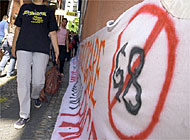G8 protest film shown in Locarno despite criticism

The Locarno film festival showed "Video Diary: the Days at G8" on its last day on Sunday. The film is a compilation of video footage of the events surrounding the G8 summit in Genoa in July. Italian government members had protested against the screening.
Apart from a five-minute introduction featuring concerts by radical rock groups at Genoa’s Social Forum venue, the one-hour film exclusively shows scenes of the confrontations between demonstrators and the police.
The film shows more shocking close-ups of the clashes during last month’s summit than any television footage. It was shot by 15 cameramen from different countries, who took part in the demonstrations and were sympathetic to the cause.
Scenes in the film show protestors setting cars alight and smashing shop windows. There are also shots of demonstrators running away from the police and being severely beaten up .
However, contrary to its original purpose the film at times shows protesters in a negative light. In one scene, police officers can be seen excercising restraint in the face of aggressive protesters.
No movie camera was apparently present at the crucial event that led to international protests when a young Italian demonstrator was shot dead by a policeman after throwing a fire extinguisher at a police car. The film only shows the victim’s body.
Reactions to the film in Locarno were ambivalent. Many of the viewers applauded the film, but others booed it for being politically speechless.
The absence of interviews with protesters means that viewers have little opportunity to understand their reasons for demonstrating at the summit. The film also fails to make a clear distinction between the ideological motivations of both peaceful and violent demonstrators.
The Italian minister of interior affairs, Claudio Scajola, was reported last week of having reservations at the film being screened in Locarno. He is believed to have tried to convince festival organisers not to show the film. Local politicians in Genoa and the province of Liguria also protested.
But the Italian artistic director of the festival, Irene Bignardi, defended her decision. She said the film was a reminder that “apart from the duty of peace-making, there is (also) a right to demonstrate”.
The festival’s president, politician Marco Solari, who is a Christian Democrat, told swissinfo that the festival had “full autonomy in selecting the films that are shown”. He said if any government tried to meddle “we wouldn’t tolerate it, neither from the government of canton Ticino nor the Swiss federal government, nor, indeed, from the Italian government.”
On a personal note, Solari told swissinfo that whoever protested at he screening of the film “should go and see it themselves”. It was, if unwittingly, remarkable in its objectivity, he said.
by Markus Haefliger

In compliance with the JTI standards
More: SWI swissinfo.ch certified by the Journalism Trust Initiative
You can find an overview of ongoing debates with our journalists here. Please join us!
If you want to start a conversation about a topic raised in this article or want to report factual errors, email us at english@swissinfo.ch.